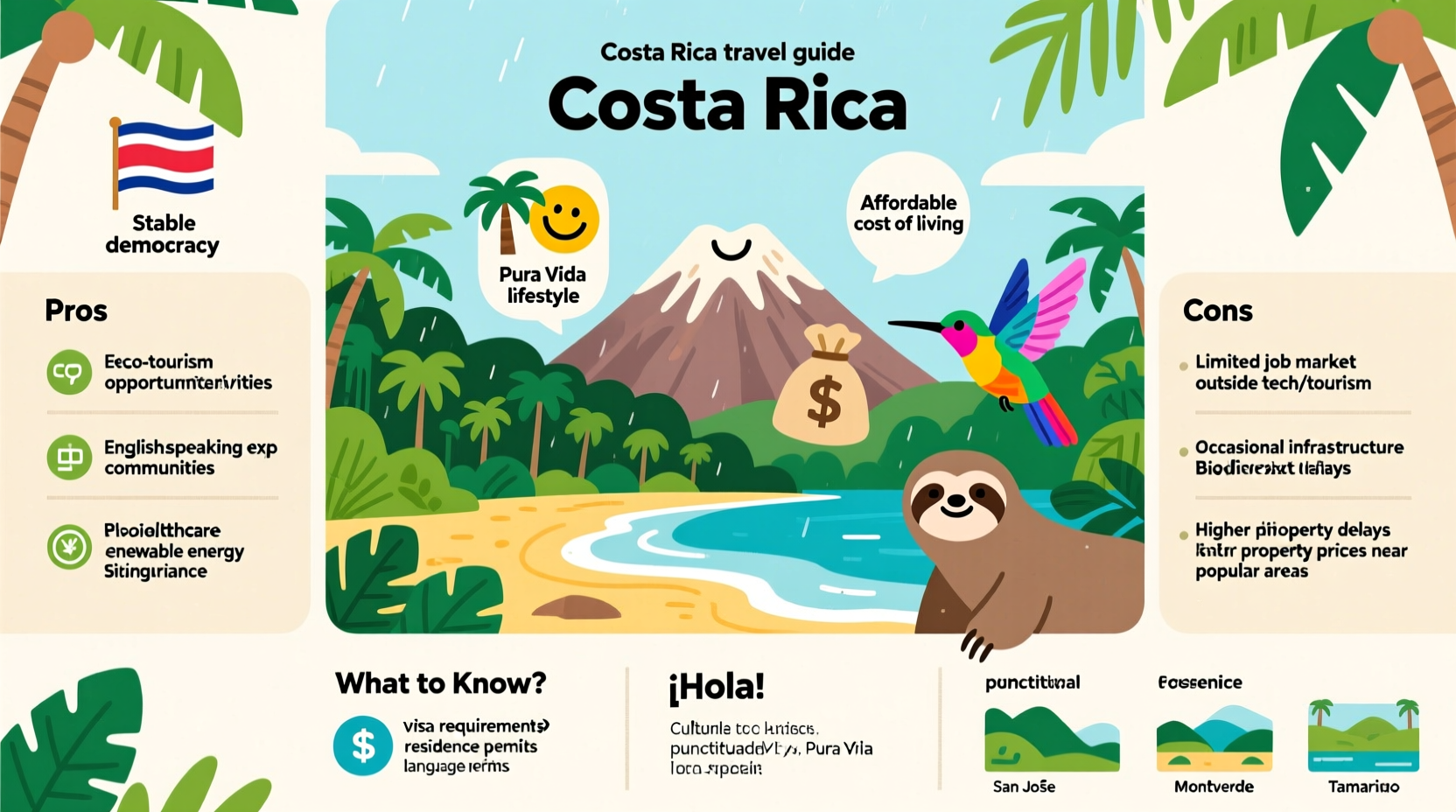Costa Rica has become a top destination for retirees, digital nomads, and families seeking a slower, more sustainable lifestyle in a tropical paradise. Nestled between the Pacific Ocean and the Caribbean Sea, this Central American gem offers lush rainforests, active volcanoes, and a political stability rare in the region. But while the idea of “pura vida” — the country’s mantra meaning “pure life” — sounds idyllic, moving abroad requires careful consideration. Understanding the real benefits, drawbacks, and logistical realities is crucial before packing your bags.
Top Reasons People Move to Costa Rica

Thousands of expatriates from North America and Europe have made Costa Rica their home, drawn by a mix of natural beauty, affordability, and quality of life. Key motivations include:
- Natural Environment: Over 25% of the country is protected land, offering unparalleled access to biodiversity, hiking, surfing, and eco-tourism.
- Moderate Climate: With consistent temperatures year-round (70–85°F), especially in the Central Valley, many find the weather ideal for outdoor living.
- Affordable Cost of Living: In many areas, you can live comfortably on $2,000–$3,000 per month, including housing, food, and healthcare.
- Political Stability: Costa Rica abolished its military in 1949 and has maintained a peaceful democracy ever since — a rarity in the region.
- Retirement-Friendly Policies: The country actively encourages foreign retirees through special residency programs like the Pensionado program.
- English-Speaking Communities: Areas like Tamarindo, Grecia, and Flamingo have established expat communities where English is widely spoken.
Pros and Cons of Relocating to Costa Rica
While the allure of pura vida is strong, every relocation comes with trade-offs. A balanced view helps set realistic expectations.
| Pros | Cons |
|---|---|
| Low crime compared to neighboring countries. Violent crime is relatively rare, especially in tourist and expat zones. | Bureaucracy can be slow. Government processes often require multiple visits and patience with paperwork. |
| Universal healthcare system (Caja Costarricense de Seguro Social). Expats can access affordable public care or opt for private insurance. | Public services vary. Internet, road conditions, and utilities may be unreliable outside major cities. |
| No property ownership restrictions for foreigners. You can buy real estate anywhere, including beachfront (with some caveats). | Property taxes rise annually. Municipal taxes (IVU) are low, but assessed values increase over time. |
| Eco-conscious culture. Recycling, organic farming, and sustainability are part of daily life in many communities. | Importing personal goods is expensive. High customs duties apply to vehicles and large shipments. |
| Friendly, welcoming locals (Ticos). Costa Ricans are known for their warmth, patience, and community spirit. | Limited job market for non-Spanish speakers. Most employment opportunities require fluency in Spanish. |
“Costa Rica isn’t just beautiful—it’s one of the few places in Latin America where long-term expats feel genuinely safe and integrated.” — Daniel Ruiz, International Relocation Consultant with 15 years in Latin America
What to Know Before You Move: Legal, Financial & Lifestyle Realities
Relocating successfully goes beyond visas and flights. Practical preparation determines how smoothly you adapt.
Residency Options
Costa Rica offers several pathways for foreigners to gain legal residency:
- Pensionado: For those receiving at least $1,000/month from retirement income, pension, or annuity.
- Rentista: Requires proof of $2,500/month in recurring income for two years.
- Inversionista: Involves investing at least $150,000 in real estate, business, or government bonds.
All options grant renewable residency with access to healthcare, banking, and local services.
Healthcare Access
Expats must enroll in the Caja system within 30 days of obtaining residency. Monthly premiums are income-based, typically ranging from $60–$150. While public hospitals can have wait times, private clinics in San José and popular expat towns offer high-quality care at reasonable prices.
Cost of Living Breakdown (Monthly Estimates)
- One-bedroom apartment (Central Valley): $600–$900
- Groceries for two: $300–$500
- Utilities (electricity, water, internet): $120–$200
- Private health insurance: $100–$200
- Dining out (moderate): $200–$400
Real-Life Example: An American Family’s Transition to the Nicoya Peninsula
The Thompsons, a family from Oregon, moved to Nosara in 2021 after years of vacationing in Costa Rica. Seeking a healthier lifestyle and lower expenses, they sold their suburban home and purchased a modest villa near Playa Guiones.
Initially charmed by the surf culture and yoga retreats, they faced challenges: their son struggled with language barriers at the local school, internet reliability affected remote work, and unexpected mold developed due to high humidity. However, by joining expat networks, hiring a bilingual tutor, and upgrading to a fiber-optic plan, they adapted within six months.
Today, they run a small rental property management service catering to English-speaking tourists. “We didn’t expect the adjustment period,” says Maria Thompson, “but now we wouldn’t go back. Our stress levels are down, and we’re more connected to nature and our community.”
Essential Checklist for Moving to Costa Rica
Use this practical checklist to organize your relocation:
- Research and visit target regions (e.g., Central Valley, Guanacaste, Southern Zone).
- Determine eligibility for residency and gather required documents (bank statements, police clearance, birth certificates).
- Rent short-term housing first to test neighborhoods before buying property.
- Learn basic Spanish or commit to lessons upon arrival.
- Secure international health insurance during the transition phase.
- Arrange shipment of essential belongings; consider selling large furniture.
- Open a local bank account and obtain a Costa Rican ID (cédula).
- Register with the local Caja office and schedule a primary care appointment.
- Connect with expat groups via Facebook or Meetup for advice and support.
- Understand vehicle import rules or purchase locally to avoid high tariffs.
Frequently Asked Questions
Can Americans own property in Costa Rica?
Yes. Foreigners enjoy the same property rights as citizens. Most beachfront land falls within a 50-meter “public zone” or a 100-meter “restricted zone” where development is limited, but you can legally own property through a corporation or direct title in many cases.
Is the tap water safe to drink?
In most urban and tourist areas, yes. The Central Valley, Tamarindo, and Manuel Antonio have potable tap water. However, in rural or coastal regions, bottled or filtered water is recommended.
How long does it take to get residency?
Processing times vary by category but generally take 3 to 6 months. The Pensionado route is often the fastest. Working with a reputable immigration lawyer can reduce delays.
Final Thoughts: Is Costa Rica Right for You?
Costa Rica offers a compelling blend of safety, natural beauty, and affordability that few countries can match. It rewards those who embrace flexibility, cultural immersion, and a slower pace of life. However, success depends on thorough research, financial planning, and emotional readiness for change.
If you value clean air, community, and a simpler way of living — and are willing to navigate bureaucratic systems and language gaps — Costa Rica could be the fresh start you’ve been seeking. Pura vida isn’t just a slogan; it’s a mindset. And for many, it’s become a way of life worth relocating for.









 浙公网安备
33010002000092号
浙公网安备
33010002000092号 浙B2-20120091-4
浙B2-20120091-4
Comments
No comments yet. Why don't you start the discussion?